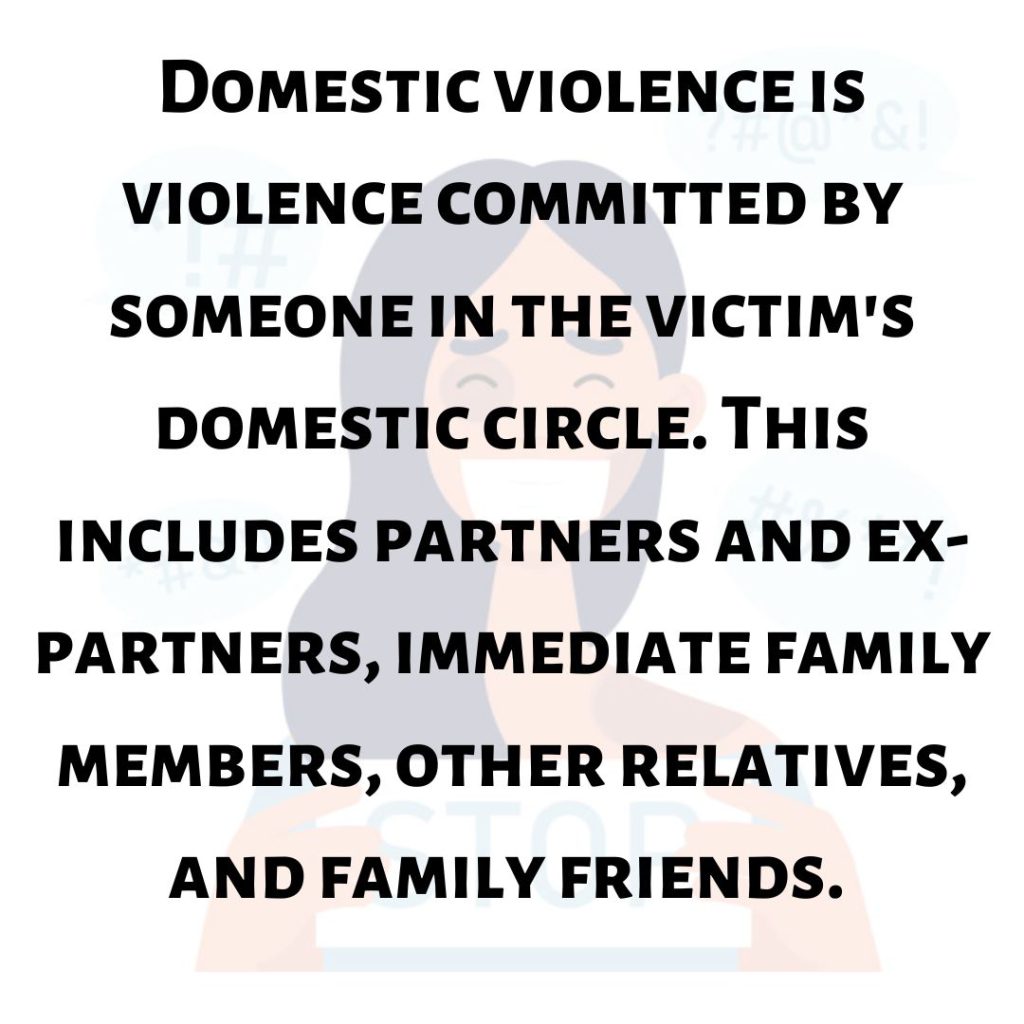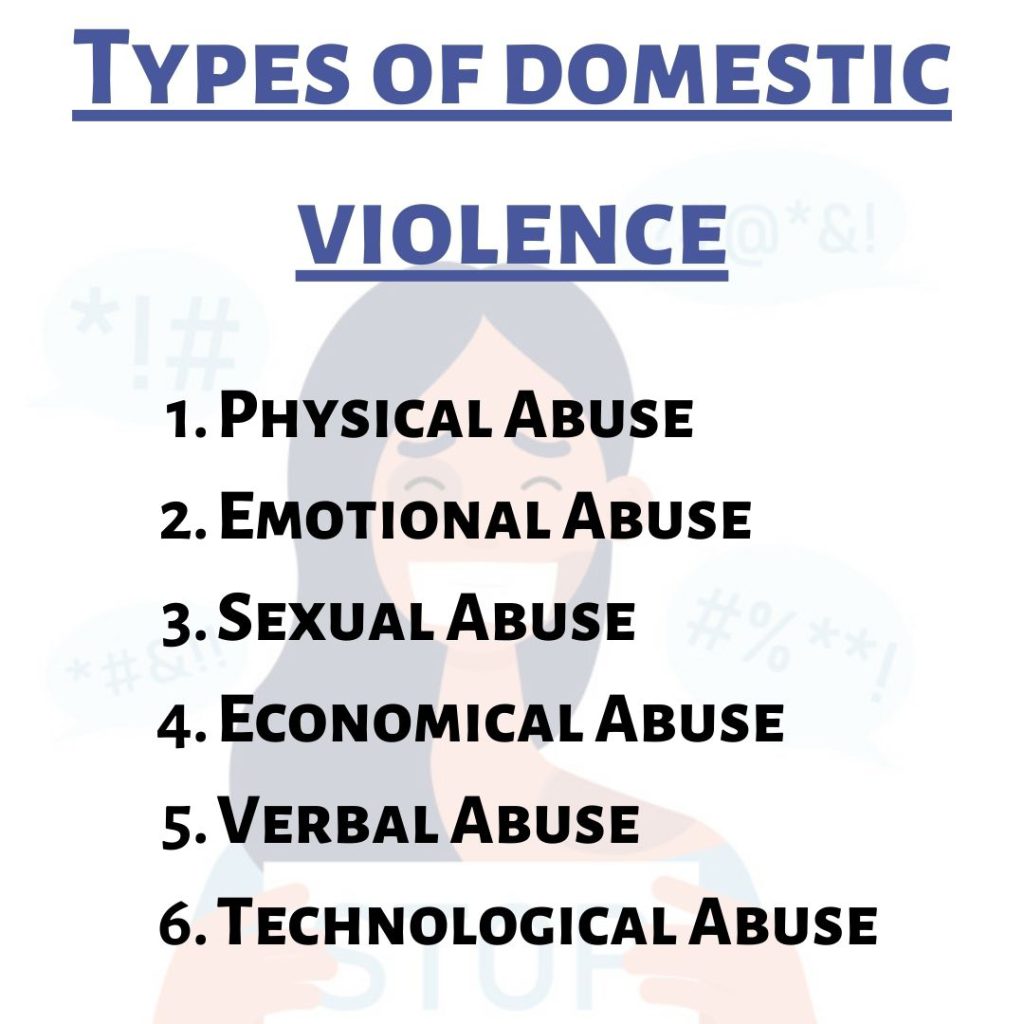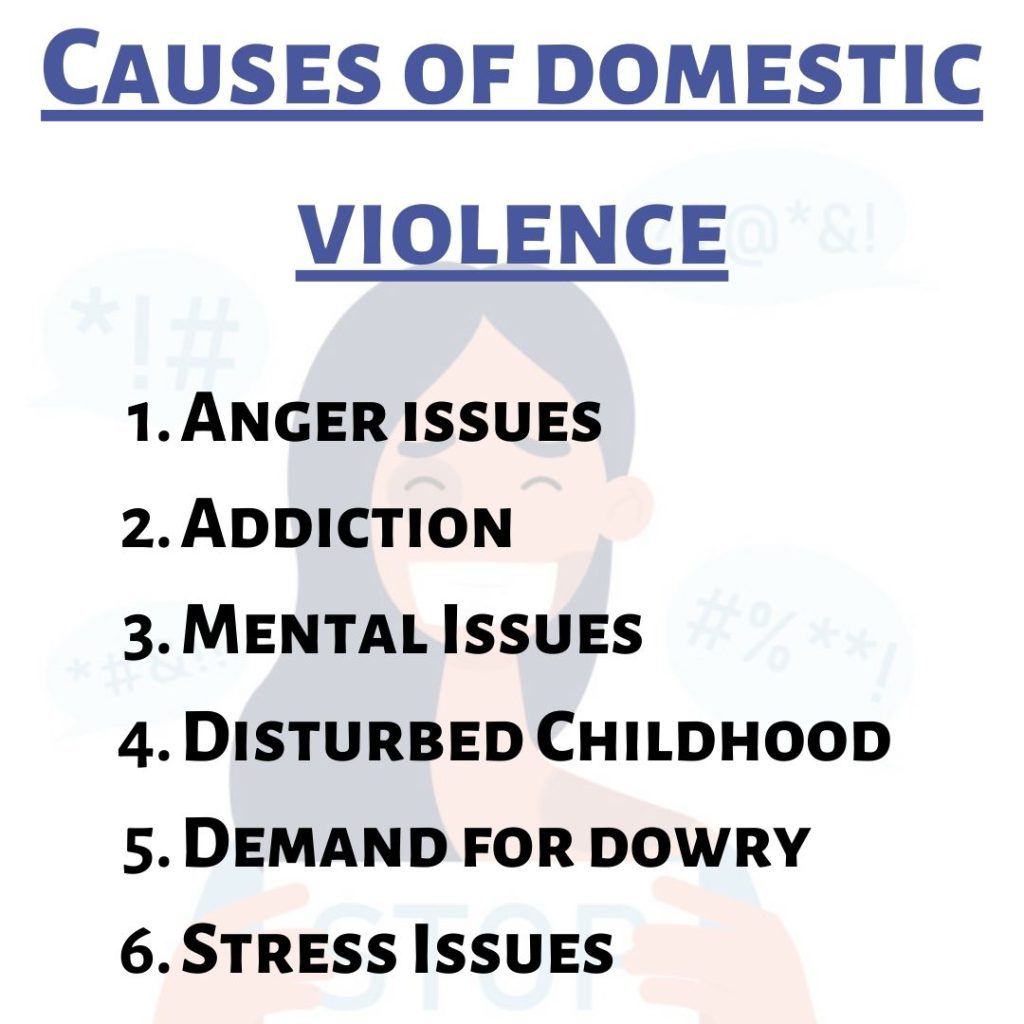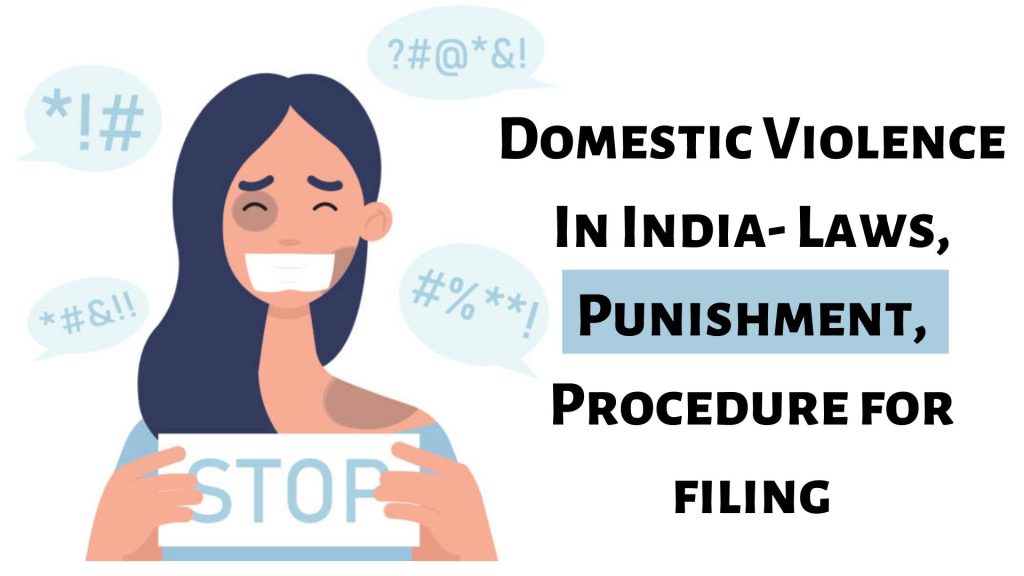Introduction
Domestic violence in India is not new, in fact, you would be surprised to know that domestic violence in India records one of the highest numbers of incidences in the world. Every day people across the country, mostly women face domestic violence irrespective of their economic status, religion, age, etc.
In this article, we are going to read about what are the laws that are made to curb domestic violence, what are the punishments included, and basically everything about domestic violence.
Keep reading to know more!
Meaning of domestic violence in India?

Domestic Violence as the name suggests is violence committed by close persons. This includes husband & ex-partners, family members, close relatives, and family friends.
Any kind of violence done by a close member of the family or as it is said in India the ‘violent act done behind the closed doors’ that nobody is supposed to interfere with is called domestic violence.
Not only women but men, children, and old people suffer from domestic violence on a day-to-day basis. This not only hampers their physical health but also their mental and emotional well-being.
In domestic violence cases generally, there is a power gap between the victim and the accused. The stronger one overpowers the weaker one.
What constitutes domestic violence?
Now the question may come what exactly is domestic violence? What are the acts that are done by the offender that come under domestic violence?
So here is the answer to this question.
According to section – 3 of the domestic violence act 2005, domestic violence includes :
- Threat to health, be it physical, mental, or emotional.
- Harassment of the victim through any form of injuries in demand of dowry, any valuable asset or property.
- Physical, emotional, verbal, sexual, and economic abuse also comes under domestic violence.
Types of domestic violence

In this section, we will discuss the types of domestic violence in detail.
- Physical Abuse
This includes any kind of violent acts such as hitting, slapping, biting, kicking, etc. Denying medical expenses also comes under physical abuse. It also includes forcing someone to drink alcohol or use any kind of drugs.
- Emotional abuse
Abusing someone emotionally means humiliating, and dismissing the feelings and thoughts of the other person. Emotional abuse also includes constant humiliation, attacking self-esteem, insults, threats of harm, belittling, and threats to take away children.
- Verbal abuse
Abusing someone through words also comes under domestic violence. Constantly calling derogatory names, and using cuss words is a form of verbal abuse.
- Sexual abuse
Abusing someone sexually includes trying to make physical relations forcefully, This is mostly the case of marital rape. Physical violence followed by sexual intercourse and attack on the sexual part of the body also constitutes sexual abuse.
- Economic abuse
When the offender deprives the aggrieved of the financial or economical resources to which she is entitled under any law or custom or which she acquires out of necessities, stridhan, her jointly or separately owned property, maintenance, and rental payments. If the offender disposes of household assets or alienates movable or immovable assets.
Restricting continued access to resources or facilities in which she has an interest entitlement by virtue of the domestic relationship including access to the shares household also is a kind of economic abuse.
- Technological Abuse
Holding and controlling the person through the help of technology is also a kind of abuse that comes with the domestic violence act.
Suggested Reading- Reasons for divorce In India
What are the Causes of domestic violence?

Domestic Violence is not a new problem in our society, It is the most common problem that takes place no matter how rich or poor you are, no matter which caste, creed, or race you belong to. domestic violence happens mostly everywhere these days.
Domestic violence is not a new problem in our society, it is the most common problem which takes place in almost every house no matter whether they are educated or not, rich or poor.
Although there is no specific reason why people engage in domestic violence but the most common reasons are discussed below.
- Anger and temperament issues
People who have anger issues and who are short-tempered tend to lose their cool over small things. These people have a high tendency to indulge in domestic violence acts because when anger overpowers them they forget what they are doing.
- Addiction
An addicted person also has a high tendency to indulge in domestic violent acts. Under the influence of alcohol and drugs, a person loses his mind and does things that he is not supposed to do.
- Mental issues
If a person has some mental issues, he may not be able to do a difference between right and wrong and is likely to get into violence.
- Disturbed childhood
If a person has had a disturbed childhood i.e he had seen some kind of violence happening in his family for a long or has suffered some mental trauma in his childhood. These kinds of situations have a very negative effect on the mind and the person overall becomes toxic. These traits are responsible for the violence that the person involves in the future. However, these things do not justify any kind of violence.
- The demand for various things
The demand for things never ends, and this need and greed for things leads to a lot of dissatisfaction leading to cruelty. Sometimes if the demand for dowry is not satisfied by the bride’s family, then it is often seen that the bride is been harassed by the groom’s family.
- Stress Issues
In Today’s world stress is a part and parcel of everybody’s life But some people are able to maintain balance and some people are not able to maintain balance. And when this disbalance happens stress overpowers the man and acts of domestic violence are seen.
What are the effects of domestic violence on the individual?
Whether the victim is a female, male, elder, or child, domestic violence is not good for anyone. It affects the physical and psychological health of the victims.
Here are a few effects that are seen on the victims of domestic violence.
- The victim becomes silent and unsocial.
- The victims isolate themselves from people.
- It may happen that the victims become a patient of depression and anxiety.
- The victim becomes quiet and unsocial.
- The victim may lose appetite and as a result, they become weak.
- If there are children present in the house, then it may happen that the children may become violent because of this toxic environment.
Basically, it destroys the happiness of people and they become distant in some of the situations when it becomes unbearable, people often try to kill themselves and some may even commit suicide.
Against whom the domestic violence case can be filed?
In the current day situation, the complaint can be lodged against any Adult Male Member who is in a Domestic Relationship with the aggrieved person and against whom the aggrieved person has sought any relief under this Act including the other members of the family, for example, Father-In-Law, Mother-In-Law, Brother-In-Law, etc. or any relative of the male partner.
What are the laws on domestic violence?
Now we will discuss the laws that are made on domestic violence.
Domestic violence and dowry death are almost happening everywhere. I am sure you must have come across someone in your life who is a victim of domestic violence and you must also have seen how people just keep on bearing all those things until it exceeds the limit.
But little did people know that there are some prominent laws that are made on domestic violence.
Let’s discuss them one by one.
- Protection of Women against Domestic Violence Act, 2005
This is an act of the Indian Parliament incorporated to protect women from Domestic Violence. It prohibits a wide range of Physical, Sexual, Emotional & Economical abuse against women and all of these are broadly defined under the Act. It provides security to women in a family from other members in a family. This law also guarantees that the abuser cannot force the victim to move out of the house.
The Act covers not only the protection of women who are married to men but also women who are living with their partners in a Live-in-relationship. A woman has the right to be liberated from any type of violence under this Act.
Under this law, the women can claim-
- Security against Domestic Violence
- Financial Compensation and maintenance
- Right to live in the mutual house
- Section 498A of the Indian Penal Code
This is a Criminal Law, which is made especially for husbands and their family members who don’t know how not treat a woman.
Under Section 498A of the IPC, harassing the woman for Dowry by the family members of the husband or by the husband is considered a Crime. This harassment can be of any type either Physical or Mental.
Despite the fact that Marital Rape isn’t considered a Crime in India, forced sex with one’s wife can be viewed as Cruelty under this Section.
It also includes behaviours and actions done against a woman which is risky for her life, can give her grave injuries, or force a woman to attempt suicide.
- Dowry Prohibition Act, 1961
This is a Criminal Law that punishes the ones who are interested in giving and taking of Dowry. The tradition of dowry itself is prohibited under the Dowry Prohibition Act, of 1961.
Under this law, a person if proven guilty of a dowry harassment case can be imprisoned for 6 months or a fine of Rs 5000/- can be imposed or you can get both imprisonment and the fine.
What is the punishment for domestic violence?
There are various guidelines or provisions being made for the protection of women against Domestic Violence under the statute such as Section 304B of the Indian Penal Code relating to dowry death.
- Under Section 313-316 of the Indian Penal Code female infanticide has been made punishable which implies forcing a woman to end her pregnancy if the family found that the baby in the womb is a girl child.
- Other Sections of the Indian Penal Code dealing with these matters are Section305-306 related to Abetment of Suicide and 340, 349 of Indian Penal Code respectively wrongful confinement and wrongful restraint.
- A complaint can also be lodged under Section 498A of the Indian Penal Code for Cruelty which also falls under Domestic Violence.
What is the procedure for filing a domestic violence complaint?
- The victim can approach the police station or can directly file a complaint with the magistrate for obtaining relief under the Act.
- The court is required to take cognizance of the complaint by scheduling a hearing within 3 days of the complaint being filed in the court.
- The Magistrate shall give notice of the date of hearing to the Protection Officer to be served to the Respondent and such other persons as directed by the Magistrate, within a maximum period of 2 days or such further reasonable time as allowed by the Magistrate.
- The court is required to dispose of the case within 60 days of the first hearing.
- The court, to establish the offence by the Respondent, can use the sole testimony of the aggrieved person.
- Upon finding the complaint genuine, the court can pass a Protection Order, which shall remain in force till the aggrieved person applies for discharge. If upon receipt of an application from the aggrieved person, the Magistrate is satisfied that the circumstances so require, he may alter, modify or revoke an order after recording the reasons in writing.
- A complaint can also be filed under Section 498 A of the Indian Penal Code, which defines the offence of matrimonial cruelty and prescribes the punishment for the husband of a woman or his relative who subjects her to cruelty.
Conclusion
The last step will be to hire a good lawyer who deals with domestic violence cases. The lawyer will bring out the best legal knowledge which will work in your favour.
I hope that this article provides you with sufficient information on domestic violence and if yes do not forget to share it with someone who might be suffering silently and need this piece of information.
